Sainsbury's Organisational Behaviour: Power, Politics, Motivation
VerifiedAdded on 2023/06/07
|15
|4306
|317
Report
AI Summary
This report provides a comprehensive analysis of organisational behaviour within a business context, using Sainsbury's as a case study to illustrate key concepts. It examines the impact of power, politics, and culture on individual and team behaviour, highlighting how these factors can influence organisational outcomes. The report evaluates process and content theories of motivation, such as ERG theory and equity theory, and their role in achieving organisational targets. It also differentiates between effective and ineffective teams, exploring the factors that contribute to team success. Furthermore, the report applies organisational behaviour philosophies to a specific business situation, assessing how these concepts influence decision-making and overall performance. Desklib offers a range of similar documents and solved assignments for students.
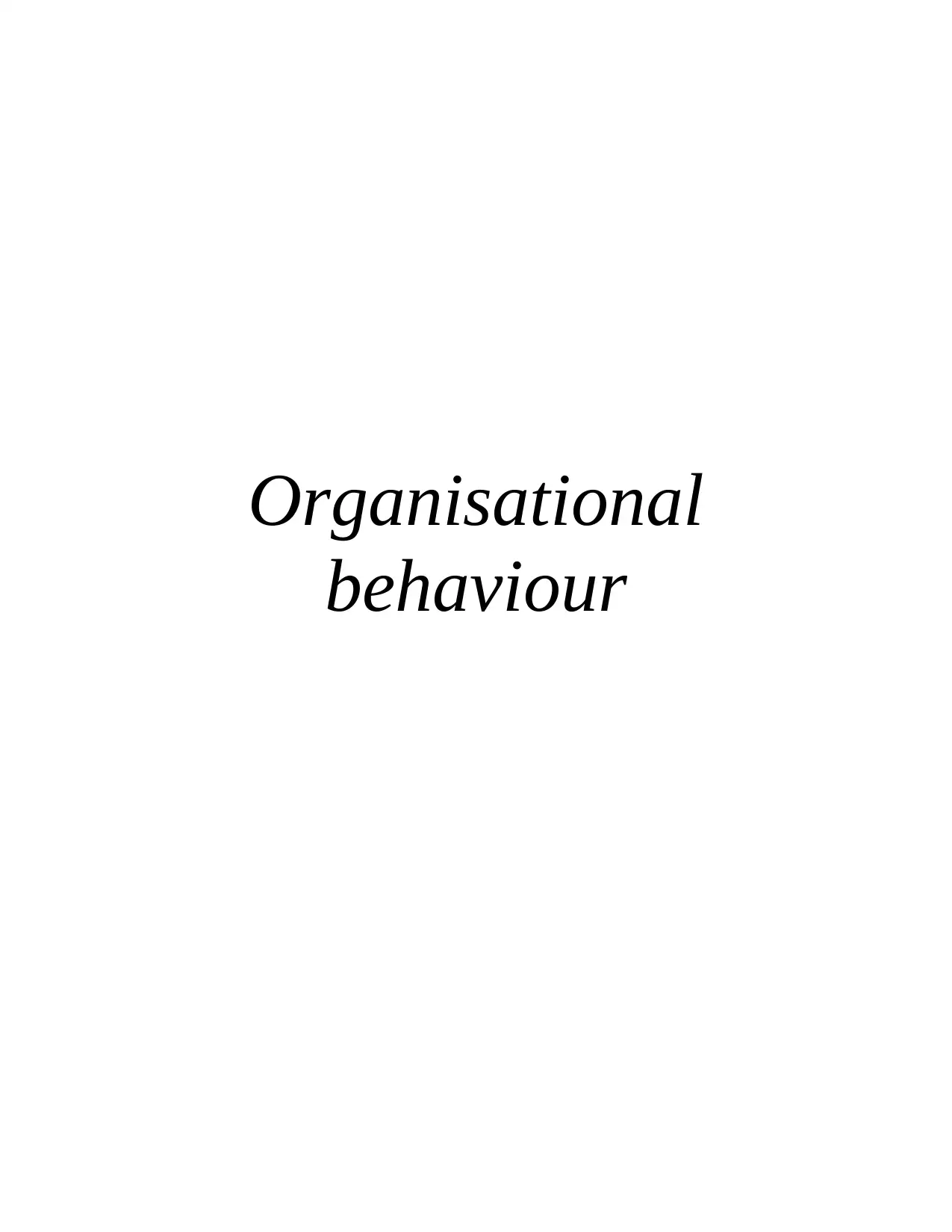
Organisational
behaviour
behaviour
Paraphrase This Document
Need a fresh take? Get an instant paraphrase of this document with our AI Paraphraser
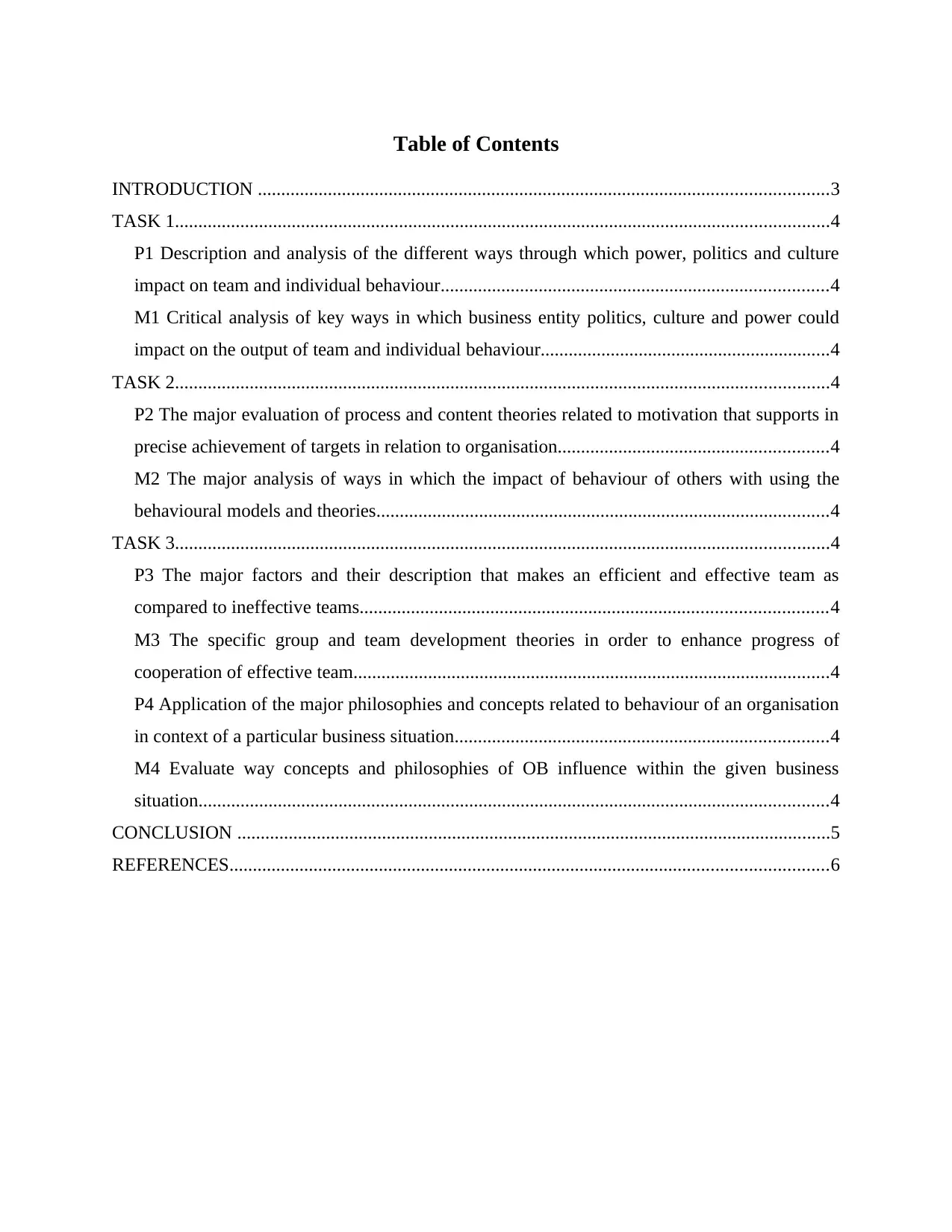
Table of Contents
INTRODUCTION ..........................................................................................................................3
TASK 1............................................................................................................................................4
P1 Description and analysis of the different ways through which power, politics and culture
impact on team and individual behaviour...................................................................................4
M1 Critical analysis of key ways in which business entity politics, culture and power could
impact on the output of team and individual behaviour..............................................................4
TASK 2............................................................................................................................................4
P2 The major evaluation of process and content theories related to motivation that supports in
precise achievement of targets in relation to organisation..........................................................4
M2 The major analysis of ways in which the impact of behaviour of others with using the
behavioural models and theories.................................................................................................4
TASK 3............................................................................................................................................4
P3 The major factors and their description that makes an efficient and effective team as
compared to ineffective teams....................................................................................................4
M3 The specific group and team development theories in order to enhance progress of
cooperation of effective team......................................................................................................4
P4 Application of the major philosophies and concepts related to behaviour of an organisation
in context of a particular business situation................................................................................4
M4 Evaluate way concepts and philosophies of OB influence within the given business
situation.......................................................................................................................................4
CONCLUSION ...............................................................................................................................5
REFERENCES................................................................................................................................6
INTRODUCTION ..........................................................................................................................3
TASK 1............................................................................................................................................4
P1 Description and analysis of the different ways through which power, politics and culture
impact on team and individual behaviour...................................................................................4
M1 Critical analysis of key ways in which business entity politics, culture and power could
impact on the output of team and individual behaviour..............................................................4
TASK 2............................................................................................................................................4
P2 The major evaluation of process and content theories related to motivation that supports in
precise achievement of targets in relation to organisation..........................................................4
M2 The major analysis of ways in which the impact of behaviour of others with using the
behavioural models and theories.................................................................................................4
TASK 3............................................................................................................................................4
P3 The major factors and their description that makes an efficient and effective team as
compared to ineffective teams....................................................................................................4
M3 The specific group and team development theories in order to enhance progress of
cooperation of effective team......................................................................................................4
P4 Application of the major philosophies and concepts related to behaviour of an organisation
in context of a particular business situation................................................................................4
M4 Evaluate way concepts and philosophies of OB influence within the given business
situation.......................................................................................................................................4
CONCLUSION ...............................................................................................................................5
REFERENCES................................................................................................................................6
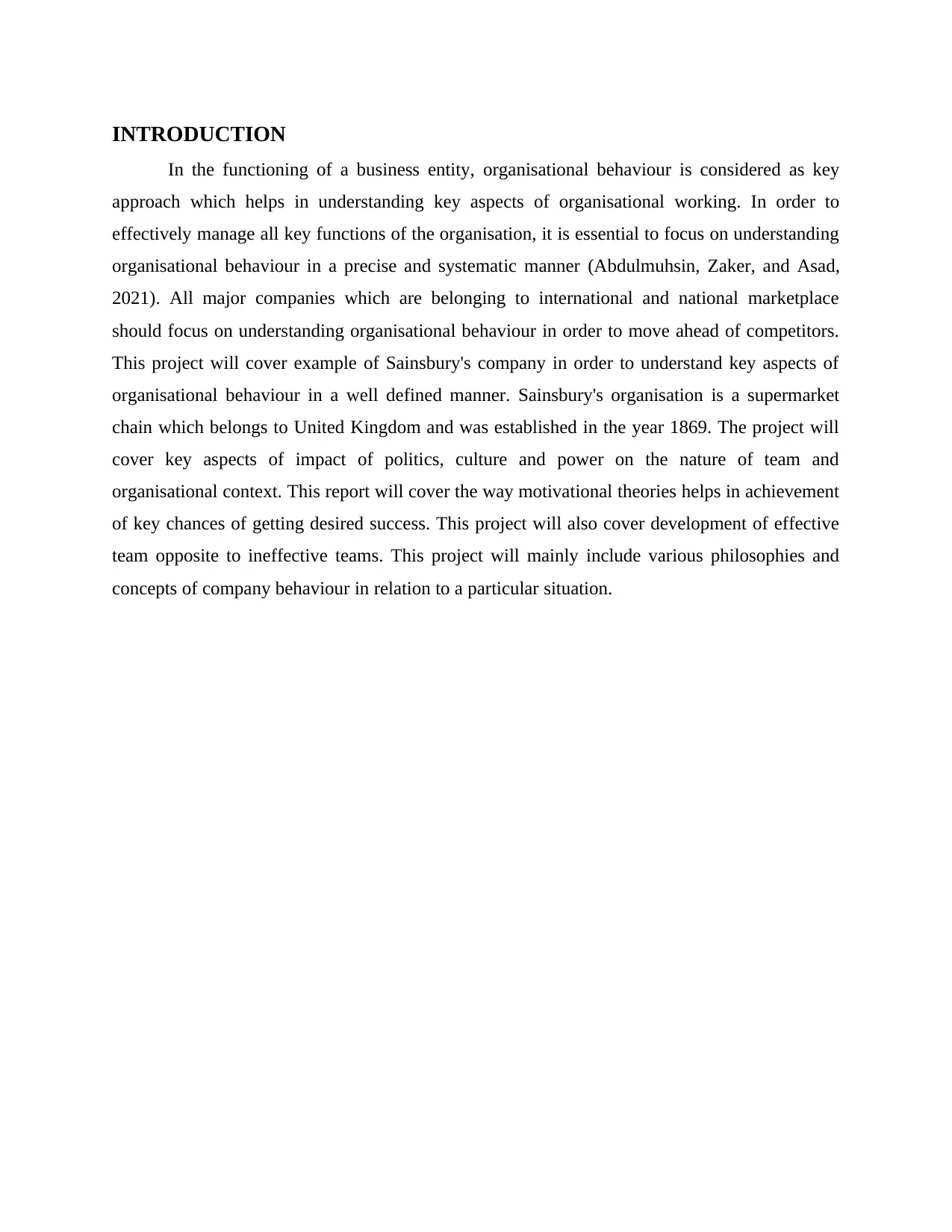
INTRODUCTION
In the functioning of a business entity, organisational behaviour is considered as key
approach which helps in understanding key aspects of organisational working. In order to
effectively manage all key functions of the organisation, it is essential to focus on understanding
organisational behaviour in a precise and systematic manner (Abdulmuhsin, Zaker, and Asad,
2021). All major companies which are belonging to international and national marketplace
should focus on understanding organisational behaviour in order to move ahead of competitors.
This project will cover example of Sainsbury's company in order to understand key aspects of
organisational behaviour in a well defined manner. Sainsbury's organisation is a supermarket
chain which belongs to United Kingdom and was established in the year 1869. The project will
cover key aspects of impact of politics, culture and power on the nature of team and
organisational context. This report will cover the way motivational theories helps in achievement
of key chances of getting desired success. This project will also cover development of effective
team opposite to ineffective teams. This project will mainly include various philosophies and
concepts of company behaviour in relation to a particular situation.
In the functioning of a business entity, organisational behaviour is considered as key
approach which helps in understanding key aspects of organisational working. In order to
effectively manage all key functions of the organisation, it is essential to focus on understanding
organisational behaviour in a precise and systematic manner (Abdulmuhsin, Zaker, and Asad,
2021). All major companies which are belonging to international and national marketplace
should focus on understanding organisational behaviour in order to move ahead of competitors.
This project will cover example of Sainsbury's company in order to understand key aspects of
organisational behaviour in a well defined manner. Sainsbury's organisation is a supermarket
chain which belongs to United Kingdom and was established in the year 1869. The project will
cover key aspects of impact of politics, culture and power on the nature of team and
organisational context. This report will cover the way motivational theories helps in achievement
of key chances of getting desired success. This project will also cover development of effective
team opposite to ineffective teams. This project will mainly include various philosophies and
concepts of company behaviour in relation to a particular situation.
⊘ This is a preview!⊘
Do you want full access?
Subscribe today to unlock all pages.

Trusted by 1+ million students worldwide
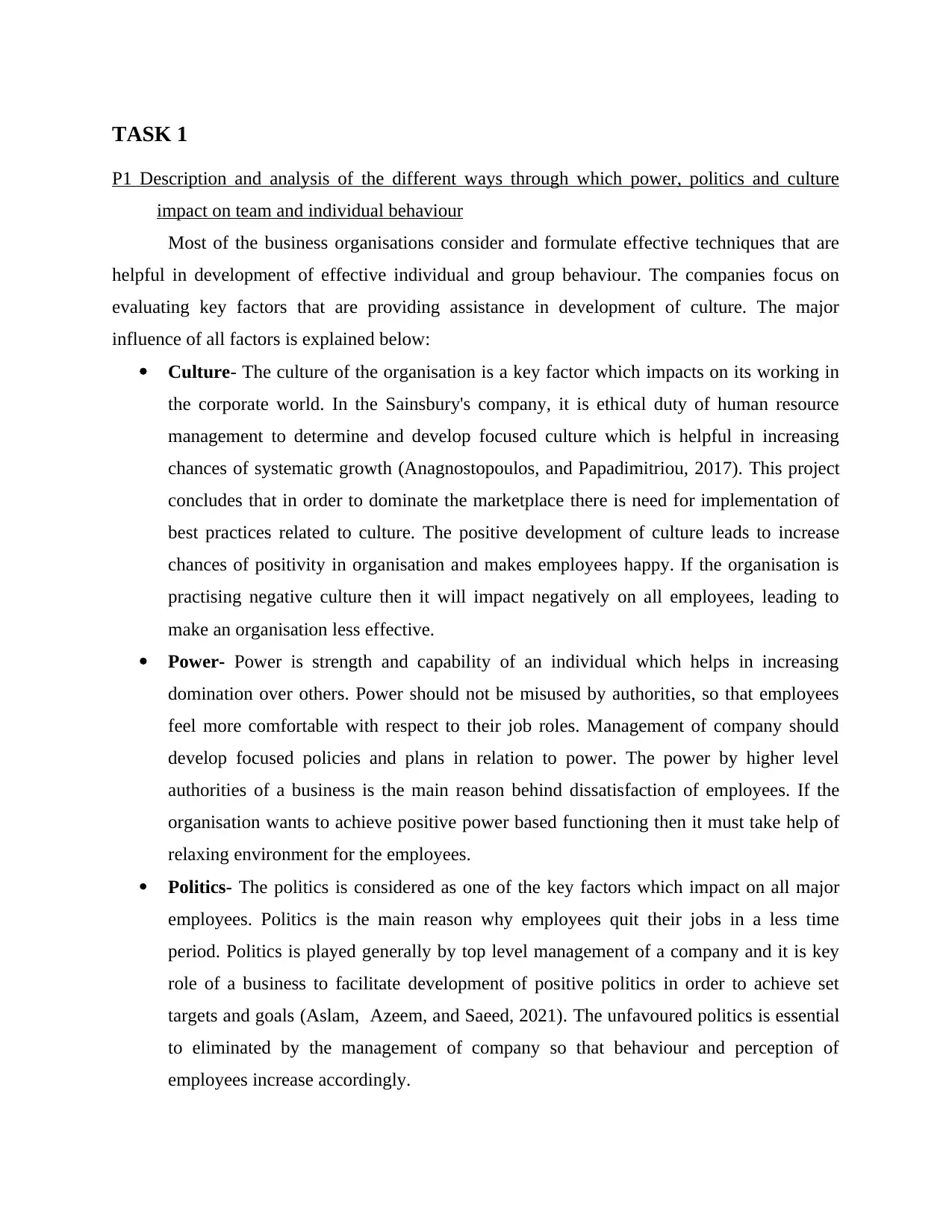
TASK 1
P1 Description and analysis of the different ways through which power, politics and culture
impact on team and individual behaviour
Most of the business organisations consider and formulate effective techniques that are
helpful in development of effective individual and group behaviour. The companies focus on
evaluating key factors that are providing assistance in development of culture. The major
influence of all factors is explained below:
Culture- The culture of the organisation is a key factor which impacts on its working in
the corporate world. In the Sainsbury's company, it is ethical duty of human resource
management to determine and develop focused culture which is helpful in increasing
chances of systematic growth (Anagnostopoulos, and Papadimitriou, 2017). This project
concludes that in order to dominate the marketplace there is need for implementation of
best practices related to culture. The positive development of culture leads to increase
chances of positivity in organisation and makes employees happy. If the organisation is
practising negative culture then it will impact negatively on all employees, leading to
make an organisation less effective.
Power- Power is strength and capability of an individual which helps in increasing
domination over others. Power should not be misused by authorities, so that employees
feel more comfortable with respect to their job roles. Management of company should
develop focused policies and plans in relation to power. The power by higher level
authorities of a business is the main reason behind dissatisfaction of employees. If the
organisation wants to achieve positive power based functioning then it must take help of
relaxing environment for the employees.
Politics- The politics is considered as one of the key factors which impact on all major
employees. Politics is the main reason why employees quit their jobs in a less time
period. Politics is played generally by top level management of a company and it is key
role of a business to facilitate development of positive politics in order to achieve set
targets and goals (Aslam, Azeem, and Saeed, 2021). The unfavoured politics is essential
to eliminated by the management of company so that behaviour and perception of
employees increase accordingly.
P1 Description and analysis of the different ways through which power, politics and culture
impact on team and individual behaviour
Most of the business organisations consider and formulate effective techniques that are
helpful in development of effective individual and group behaviour. The companies focus on
evaluating key factors that are providing assistance in development of culture. The major
influence of all factors is explained below:
Culture- The culture of the organisation is a key factor which impacts on its working in
the corporate world. In the Sainsbury's company, it is ethical duty of human resource
management to determine and develop focused culture which is helpful in increasing
chances of systematic growth (Anagnostopoulos, and Papadimitriou, 2017). This project
concludes that in order to dominate the marketplace there is need for implementation of
best practices related to culture. The positive development of culture leads to increase
chances of positivity in organisation and makes employees happy. If the organisation is
practising negative culture then it will impact negatively on all employees, leading to
make an organisation less effective.
Power- Power is strength and capability of an individual which helps in increasing
domination over others. Power should not be misused by authorities, so that employees
feel more comfortable with respect to their job roles. Management of company should
develop focused policies and plans in relation to power. The power by higher level
authorities of a business is the main reason behind dissatisfaction of employees. If the
organisation wants to achieve positive power based functioning then it must take help of
relaxing environment for the employees.
Politics- The politics is considered as one of the key factors which impact on all major
employees. Politics is the main reason why employees quit their jobs in a less time
period. Politics is played generally by top level management of a company and it is key
role of a business to facilitate development of positive politics in order to achieve set
targets and goals (Aslam, Azeem, and Saeed, 2021). The unfavoured politics is essential
to eliminated by the management of company so that behaviour and perception of
employees increase accordingly.
Paraphrase This Document
Need a fresh take? Get an instant paraphrase of this document with our AI Paraphraser
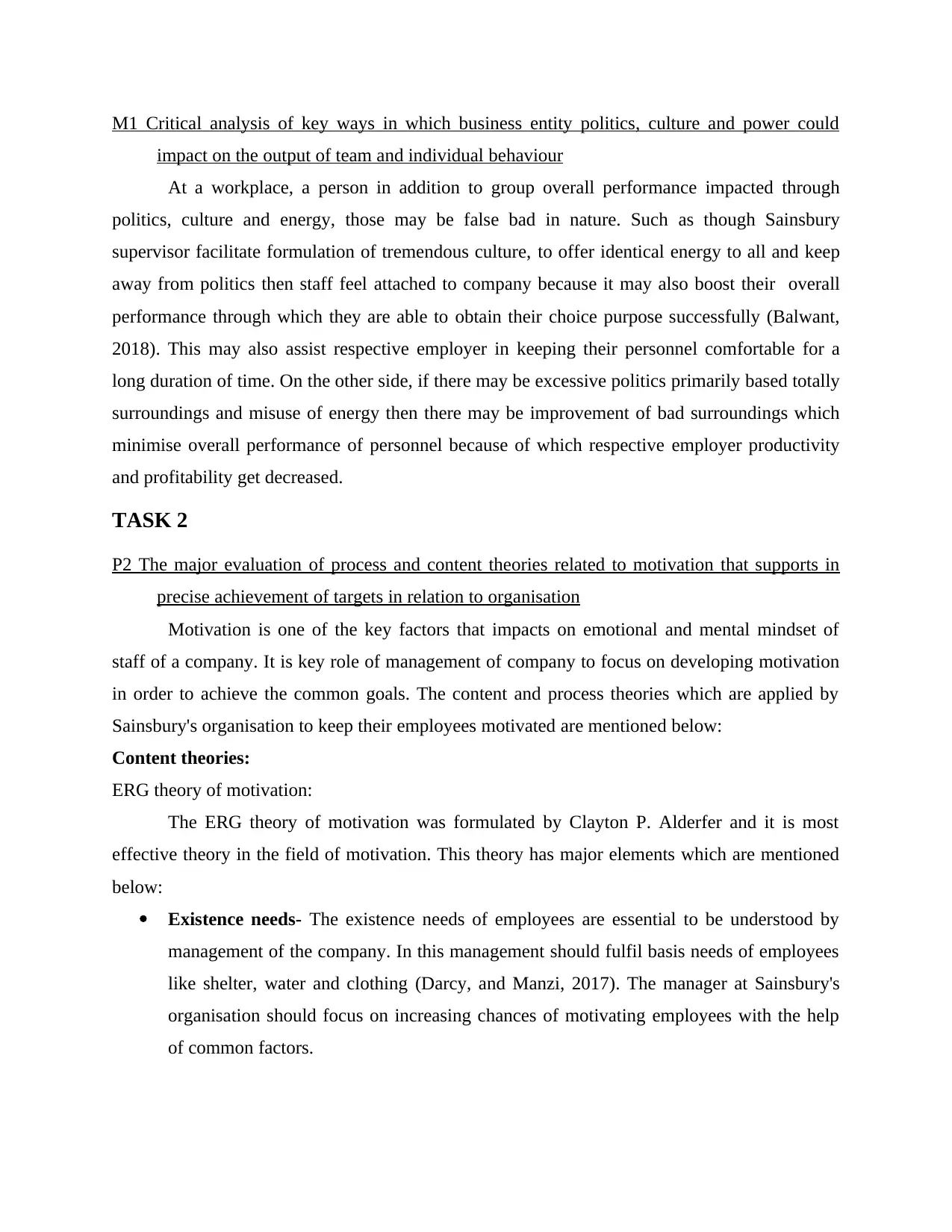
M1 Critical analysis of key ways in which business entity politics, culture and power could
impact on the output of team and individual behaviour
At a workplace, a person in addition to group overall performance impacted through
politics, culture and energy, those may be false bad in nature. Such as though Sainsbury
supervisor facilitate formulation of tremendous culture, to offer identical energy to all and keep
away from politics then staff feel attached to company because it may also boost their overall
performance through which they are able to obtain their choice purpose successfully (Balwant,
2018). This may also assist respective employer in keeping their personnel comfortable for a
long duration of time. On the other side, if there may be excessive politics primarily based totally
surroundings and misuse of energy then there may be improvement of bad surroundings which
minimise overall performance of personnel because of which respective employer productivity
and profitability get decreased.
TASK 2
P2 The major evaluation of process and content theories related to motivation that supports in
precise achievement of targets in relation to organisation
Motivation is one of the key factors that impacts on emotional and mental mindset of
staff of a company. It is key role of management of company to focus on developing motivation
in order to achieve the common goals. The content and process theories which are applied by
Sainsbury's organisation to keep their employees motivated are mentioned below:
Content theories:
ERG theory of motivation:
The ERG theory of motivation was formulated by Clayton P. Alderfer and it is most
effective theory in the field of motivation. This theory has major elements which are mentioned
below:
Existence needs- The existence needs of employees are essential to be understood by
management of the company. In this management should fulfil basis needs of employees
like shelter, water and clothing (Darcy, and Manzi, 2017). The manager at Sainsbury's
organisation should focus on increasing chances of motivating employees with the help
of common factors.
impact on the output of team and individual behaviour
At a workplace, a person in addition to group overall performance impacted through
politics, culture and energy, those may be false bad in nature. Such as though Sainsbury
supervisor facilitate formulation of tremendous culture, to offer identical energy to all and keep
away from politics then staff feel attached to company because it may also boost their overall
performance through which they are able to obtain their choice purpose successfully (Balwant,
2018). This may also assist respective employer in keeping their personnel comfortable for a
long duration of time. On the other side, if there may be excessive politics primarily based totally
surroundings and misuse of energy then there may be improvement of bad surroundings which
minimise overall performance of personnel because of which respective employer productivity
and profitability get decreased.
TASK 2
P2 The major evaluation of process and content theories related to motivation that supports in
precise achievement of targets in relation to organisation
Motivation is one of the key factors that impacts on emotional and mental mindset of
staff of a company. It is key role of management of company to focus on developing motivation
in order to achieve the common goals. The content and process theories which are applied by
Sainsbury's organisation to keep their employees motivated are mentioned below:
Content theories:
ERG theory of motivation:
The ERG theory of motivation was formulated by Clayton P. Alderfer and it is most
effective theory in the field of motivation. This theory has major elements which are mentioned
below:
Existence needs- The existence needs of employees are essential to be understood by
management of the company. In this management should fulfil basis needs of employees
like shelter, water and clothing (Darcy, and Manzi, 2017). The manager at Sainsbury's
organisation should focus on increasing chances of motivating employees with the help
of common factors.
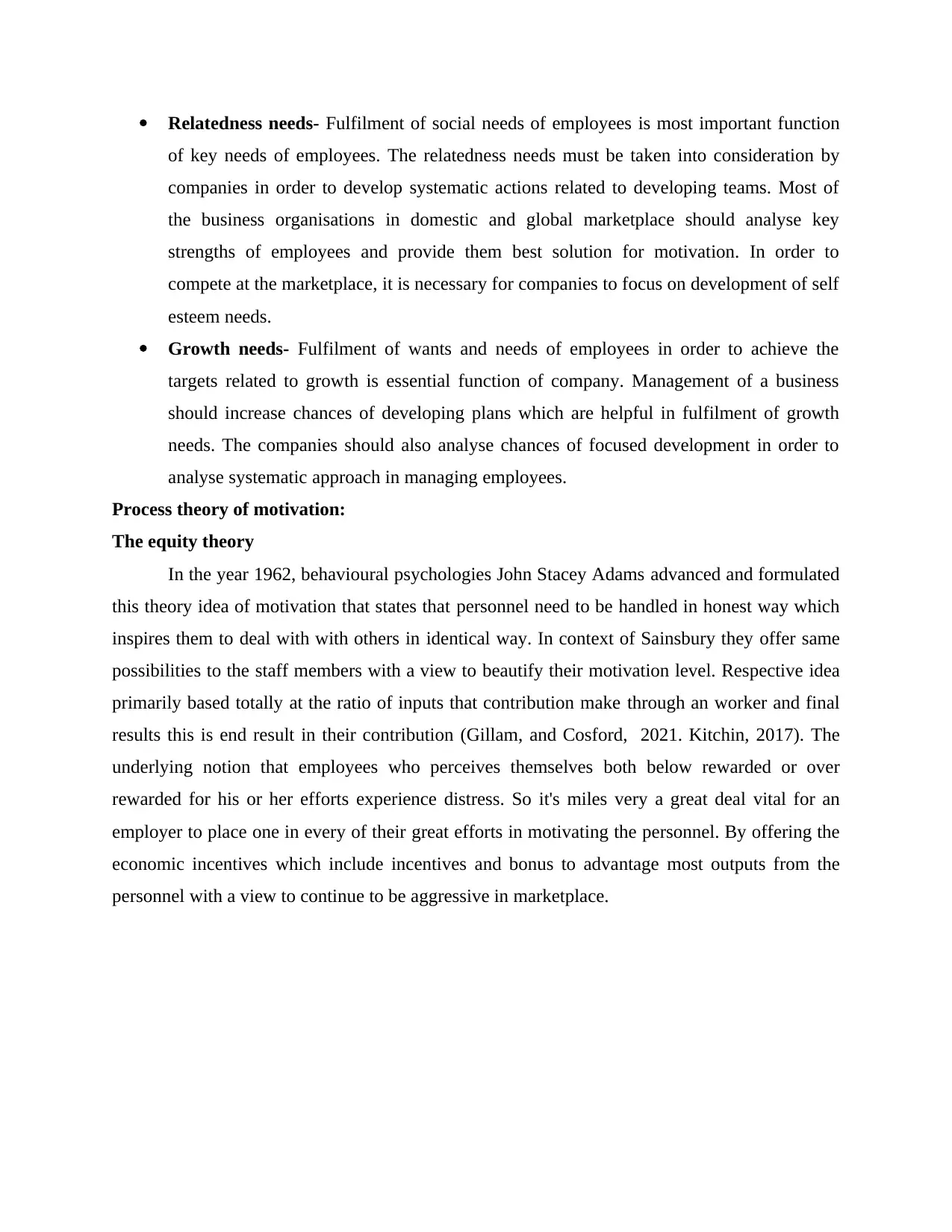
Relatedness needs- Fulfilment of social needs of employees is most important function
of key needs of employees. The relatedness needs must be taken into consideration by
companies in order to develop systematic actions related to developing teams. Most of
the business organisations in domestic and global marketplace should analyse key
strengths of employees and provide them best solution for motivation. In order to
compete at the marketplace, it is necessary for companies to focus on development of self
esteem needs.
Growth needs- Fulfilment of wants and needs of employees in order to achieve the
targets related to growth is essential function of company. Management of a business
should increase chances of developing plans which are helpful in fulfilment of growth
needs. The companies should also analyse chances of focused development in order to
analyse systematic approach in managing employees.
Process theory of motivation:
The equity theory
In the year 1962, behavioural psychologies John Stacey Adams advanced and formulated
this theory idea of motivation that states that personnel need to be handled in honest way which
inspires them to deal with with others in identical way. In context of Sainsbury they offer same
possibilities to the staff members with a view to beautify their motivation level. Respective idea
primarily based totally at the ratio of inputs that contribution make through an worker and final
results this is end result in their contribution (Gillam, and Cosford, 2021. Kitchin, 2017). The
underlying notion that employees who perceives themselves both below rewarded or over
rewarded for his or her efforts experience distress. So it's miles very a great deal vital for an
employer to place one in every of their great efforts in motivating the personnel. By offering the
economic incentives which include incentives and bonus to advantage most outputs from the
personnel with a view to continue to be aggressive in marketplace.
of key needs of employees. The relatedness needs must be taken into consideration by
companies in order to develop systematic actions related to developing teams. Most of
the business organisations in domestic and global marketplace should analyse key
strengths of employees and provide them best solution for motivation. In order to
compete at the marketplace, it is necessary for companies to focus on development of self
esteem needs.
Growth needs- Fulfilment of wants and needs of employees in order to achieve the
targets related to growth is essential function of company. Management of a business
should increase chances of developing plans which are helpful in fulfilment of growth
needs. The companies should also analyse chances of focused development in order to
analyse systematic approach in managing employees.
Process theory of motivation:
The equity theory
In the year 1962, behavioural psychologies John Stacey Adams advanced and formulated
this theory idea of motivation that states that personnel need to be handled in honest way which
inspires them to deal with with others in identical way. In context of Sainsbury they offer same
possibilities to the staff members with a view to beautify their motivation level. Respective idea
primarily based totally at the ratio of inputs that contribution make through an worker and final
results this is end result in their contribution (Gillam, and Cosford, 2021. Kitchin, 2017). The
underlying notion that employees who perceives themselves both below rewarded or over
rewarded for his or her efforts experience distress. So it's miles very a great deal vital for an
employer to place one in every of their great efforts in motivating the personnel. By offering the
economic incentives which include incentives and bonus to advantage most outputs from the
personnel with a view to continue to be aggressive in marketplace.
⊘ This is a preview!⊘
Do you want full access?
Subscribe today to unlock all pages.

Trusted by 1+ million students worldwide
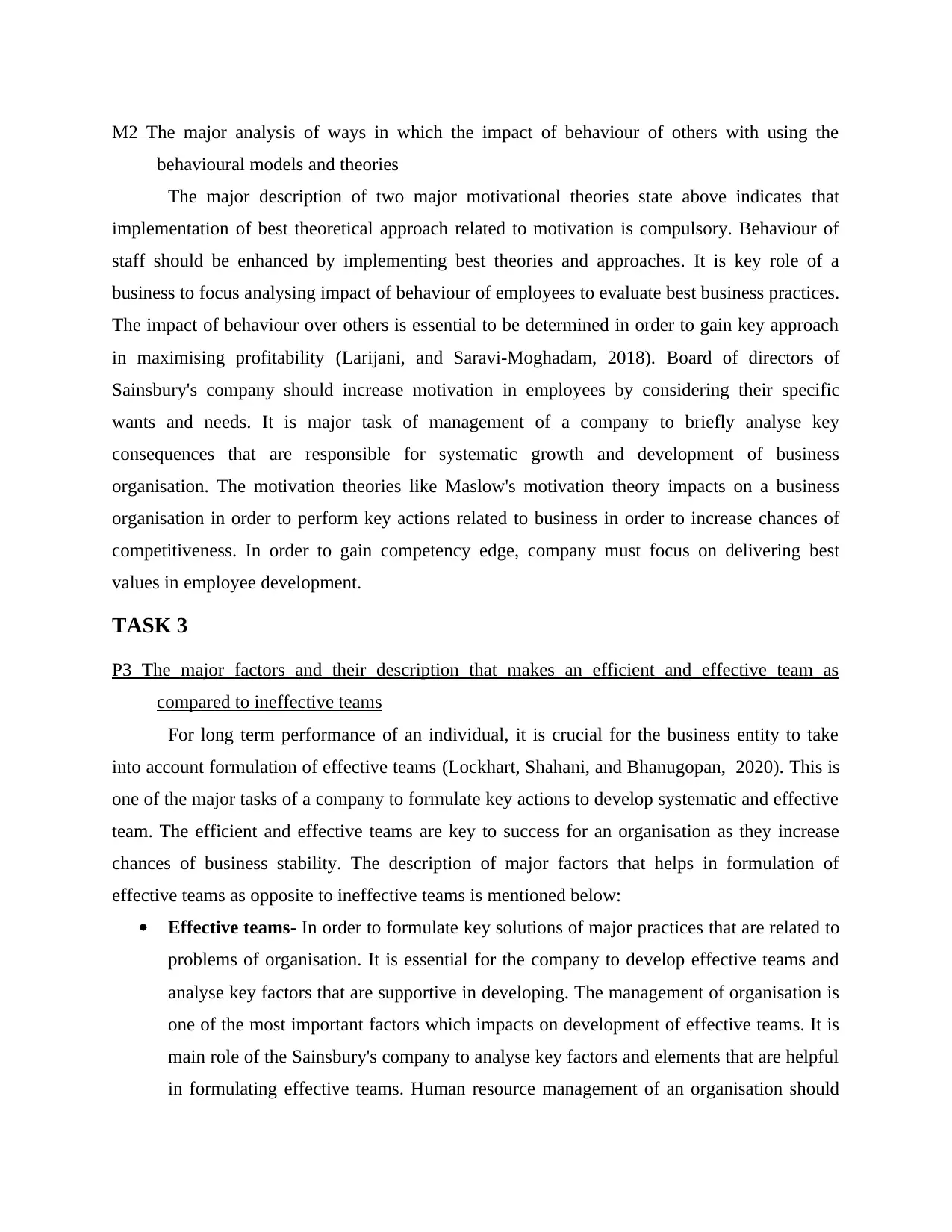
M2 The major analysis of ways in which the impact of behaviour of others with using the
behavioural models and theories
The major description of two major motivational theories state above indicates that
implementation of best theoretical approach related to motivation is compulsory. Behaviour of
staff should be enhanced by implementing best theories and approaches. It is key role of a
business to focus analysing impact of behaviour of employees to evaluate best business practices.
The impact of behaviour over others is essential to be determined in order to gain key approach
in maximising profitability (Larijani, and Saravi-Moghadam, 2018). Board of directors of
Sainsbury's company should increase motivation in employees by considering their specific
wants and needs. It is major task of management of a company to briefly analyse key
consequences that are responsible for systematic growth and development of business
organisation. The motivation theories like Maslow's motivation theory impacts on a business
organisation in order to perform key actions related to business in order to increase chances of
competitiveness. In order to gain competency edge, company must focus on delivering best
values in employee development.
TASK 3
P3 The major factors and their description that makes an efficient and effective team as
compared to ineffective teams
For long term performance of an individual, it is crucial for the business entity to take
into account formulation of effective teams (Lockhart, Shahani, and Bhanugopan, 2020). This is
one of the major tasks of a company to formulate key actions to develop systematic and effective
team. The efficient and effective teams are key to success for an organisation as they increase
chances of business stability. The description of major factors that helps in formulation of
effective teams as opposite to ineffective teams is mentioned below:
Effective teams- In order to formulate key solutions of major practices that are related to
problems of organisation. It is essential for the company to develop effective teams and
analyse key factors that are supportive in developing. The management of organisation is
one of the most important factors which impacts on development of effective teams. It is
main role of the Sainsbury's company to analyse key factors and elements that are helpful
in formulating effective teams. Human resource management of an organisation should
behavioural models and theories
The major description of two major motivational theories state above indicates that
implementation of best theoretical approach related to motivation is compulsory. Behaviour of
staff should be enhanced by implementing best theories and approaches. It is key role of a
business to focus analysing impact of behaviour of employees to evaluate best business practices.
The impact of behaviour over others is essential to be determined in order to gain key approach
in maximising profitability (Larijani, and Saravi-Moghadam, 2018). Board of directors of
Sainsbury's company should increase motivation in employees by considering their specific
wants and needs. It is major task of management of a company to briefly analyse key
consequences that are responsible for systematic growth and development of business
organisation. The motivation theories like Maslow's motivation theory impacts on a business
organisation in order to perform key actions related to business in order to increase chances of
competitiveness. In order to gain competency edge, company must focus on delivering best
values in employee development.
TASK 3
P3 The major factors and their description that makes an efficient and effective team as
compared to ineffective teams
For long term performance of an individual, it is crucial for the business entity to take
into account formulation of effective teams (Lockhart, Shahani, and Bhanugopan, 2020). This is
one of the major tasks of a company to formulate key actions to develop systematic and effective
team. The efficient and effective teams are key to success for an organisation as they increase
chances of business stability. The description of major factors that helps in formulation of
effective teams as opposite to ineffective teams is mentioned below:
Effective teams- In order to formulate key solutions of major practices that are related to
problems of organisation. It is essential for the company to develop effective teams and
analyse key factors that are supportive in developing. The management of organisation is
one of the most important factors which impacts on development of effective teams. It is
main role of the Sainsbury's company to analyse key factors and elements that are helpful
in formulating effective teams. Human resource management of an organisation should
Paraphrase This Document
Need a fresh take? Get an instant paraphrase of this document with our AI Paraphraser
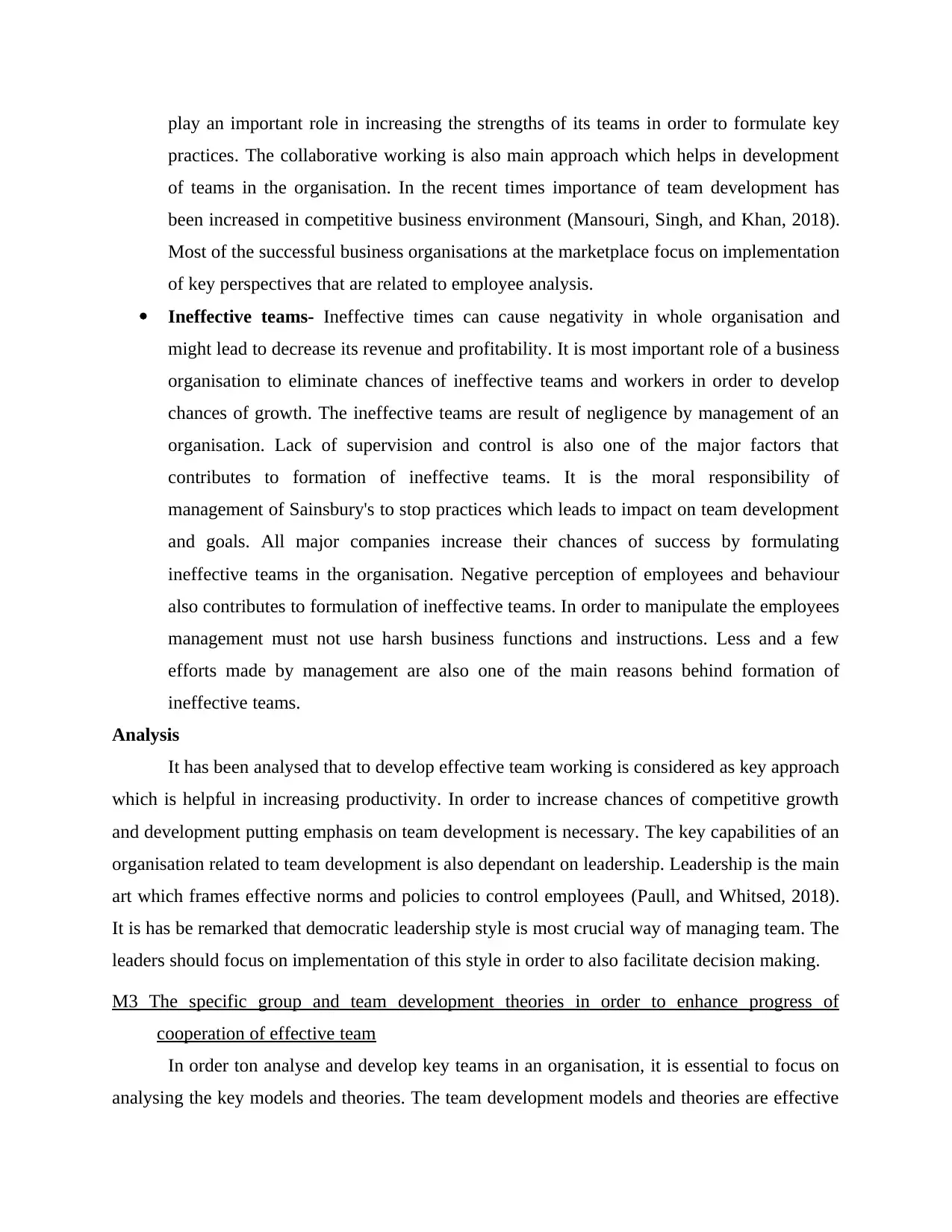
play an important role in increasing the strengths of its teams in order to formulate key
practices. The collaborative working is also main approach which helps in development
of teams in the organisation. In the recent times importance of team development has
been increased in competitive business environment (Mansouri, Singh, and Khan, 2018).
Most of the successful business organisations at the marketplace focus on implementation
of key perspectives that are related to employee analysis.
Ineffective teams- Ineffective times can cause negativity in whole organisation and
might lead to decrease its revenue and profitability. It is most important role of a business
organisation to eliminate chances of ineffective teams and workers in order to develop
chances of growth. The ineffective teams are result of negligence by management of an
organisation. Lack of supervision and control is also one of the major factors that
contributes to formation of ineffective teams. It is the moral responsibility of
management of Sainsbury's to stop practices which leads to impact on team development
and goals. All major companies increase their chances of success by formulating
ineffective teams in the organisation. Negative perception of employees and behaviour
also contributes to formulation of ineffective teams. In order to manipulate the employees
management must not use harsh business functions and instructions. Less and a few
efforts made by management are also one of the main reasons behind formation of
ineffective teams.
Analysis
It has been analysed that to develop effective team working is considered as key approach
which is helpful in increasing productivity. In order to increase chances of competitive growth
and development putting emphasis on team development is necessary. The key capabilities of an
organisation related to team development is also dependant on leadership. Leadership is the main
art which frames effective norms and policies to control employees (Paull, and Whitsed, 2018).
It is has be remarked that democratic leadership style is most crucial way of managing team. The
leaders should focus on implementation of this style in order to also facilitate decision making.
M3 The specific group and team development theories in order to enhance progress of
cooperation of effective team
In order ton analyse and develop key teams in an organisation, it is essential to focus on
analysing the key models and theories. The team development models and theories are effective
practices. The collaborative working is also main approach which helps in development
of teams in the organisation. In the recent times importance of team development has
been increased in competitive business environment (Mansouri, Singh, and Khan, 2018).
Most of the successful business organisations at the marketplace focus on implementation
of key perspectives that are related to employee analysis.
Ineffective teams- Ineffective times can cause negativity in whole organisation and
might lead to decrease its revenue and profitability. It is most important role of a business
organisation to eliminate chances of ineffective teams and workers in order to develop
chances of growth. The ineffective teams are result of negligence by management of an
organisation. Lack of supervision and control is also one of the major factors that
contributes to formation of ineffective teams. It is the moral responsibility of
management of Sainsbury's to stop practices which leads to impact on team development
and goals. All major companies increase their chances of success by formulating
ineffective teams in the organisation. Negative perception of employees and behaviour
also contributes to formulation of ineffective teams. In order to manipulate the employees
management must not use harsh business functions and instructions. Less and a few
efforts made by management are also one of the main reasons behind formation of
ineffective teams.
Analysis
It has been analysed that to develop effective team working is considered as key approach
which is helpful in increasing productivity. In order to increase chances of competitive growth
and development putting emphasis on team development is necessary. The key capabilities of an
organisation related to team development is also dependant on leadership. Leadership is the main
art which frames effective norms and policies to control employees (Paull, and Whitsed, 2018).
It is has be remarked that democratic leadership style is most crucial way of managing team. The
leaders should focus on implementation of this style in order to also facilitate decision making.
M3 The specific group and team development theories in order to enhance progress of
cooperation of effective team
In order ton analyse and develop key teams in an organisation, it is essential to focus on
analysing the key models and theories. The team development models and theories are effective
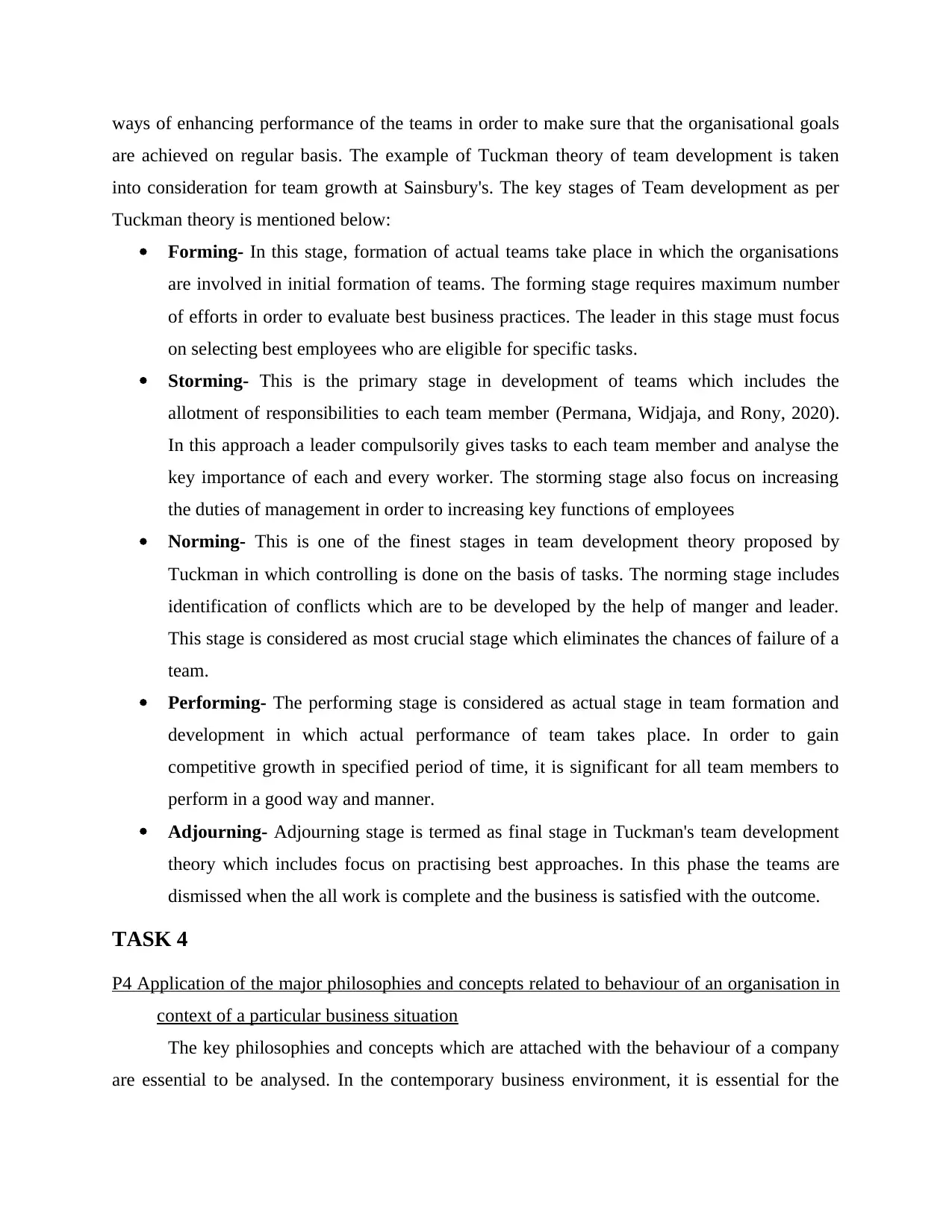
ways of enhancing performance of the teams in order to make sure that the organisational goals
are achieved on regular basis. The example of Tuckman theory of team development is taken
into consideration for team growth at Sainsbury's. The key stages of Team development as per
Tuckman theory is mentioned below:
Forming- In this stage, formation of actual teams take place in which the organisations
are involved in initial formation of teams. The forming stage requires maximum number
of efforts in order to evaluate best business practices. The leader in this stage must focus
on selecting best employees who are eligible for specific tasks.
Storming- This is the primary stage in development of teams which includes the
allotment of responsibilities to each team member (Permana, Widjaja, and Rony, 2020).
In this approach a leader compulsorily gives tasks to each team member and analyse the
key importance of each and every worker. The storming stage also focus on increasing
the duties of management in order to increasing key functions of employees
Norming- This is one of the finest stages in team development theory proposed by
Tuckman in which controlling is done on the basis of tasks. The norming stage includes
identification of conflicts which are to be developed by the help of manger and leader.
This stage is considered as most crucial stage which eliminates the chances of failure of a
team.
Performing- The performing stage is considered as actual stage in team formation and
development in which actual performance of team takes place. In order to gain
competitive growth in specified period of time, it is significant for all team members to
perform in a good way and manner.
Adjourning- Adjourning stage is termed as final stage in Tuckman's team development
theory which includes focus on practising best approaches. In this phase the teams are
dismissed when the all work is complete and the business is satisfied with the outcome.
TASK 4
P4 Application of the major philosophies and concepts related to behaviour of an organisation in
context of a particular business situation
The key philosophies and concepts which are attached with the behaviour of a company
are essential to be analysed. In the contemporary business environment, it is essential for the
are achieved on regular basis. The example of Tuckman theory of team development is taken
into consideration for team growth at Sainsbury's. The key stages of Team development as per
Tuckman theory is mentioned below:
Forming- In this stage, formation of actual teams take place in which the organisations
are involved in initial formation of teams. The forming stage requires maximum number
of efforts in order to evaluate best business practices. The leader in this stage must focus
on selecting best employees who are eligible for specific tasks.
Storming- This is the primary stage in development of teams which includes the
allotment of responsibilities to each team member (Permana, Widjaja, and Rony, 2020).
In this approach a leader compulsorily gives tasks to each team member and analyse the
key importance of each and every worker. The storming stage also focus on increasing
the duties of management in order to increasing key functions of employees
Norming- This is one of the finest stages in team development theory proposed by
Tuckman in which controlling is done on the basis of tasks. The norming stage includes
identification of conflicts which are to be developed by the help of manger and leader.
This stage is considered as most crucial stage which eliminates the chances of failure of a
team.
Performing- The performing stage is considered as actual stage in team formation and
development in which actual performance of team takes place. In order to gain
competitive growth in specified period of time, it is significant for all team members to
perform in a good way and manner.
Adjourning- Adjourning stage is termed as final stage in Tuckman's team development
theory which includes focus on practising best approaches. In this phase the teams are
dismissed when the all work is complete and the business is satisfied with the outcome.
TASK 4
P4 Application of the major philosophies and concepts related to behaviour of an organisation in
context of a particular business situation
The key philosophies and concepts which are attached with the behaviour of a company
are essential to be analysed. In the contemporary business environment, it is essential for the
⊘ This is a preview!⊘
Do you want full access?
Subscribe today to unlock all pages.

Trusted by 1+ million students worldwide
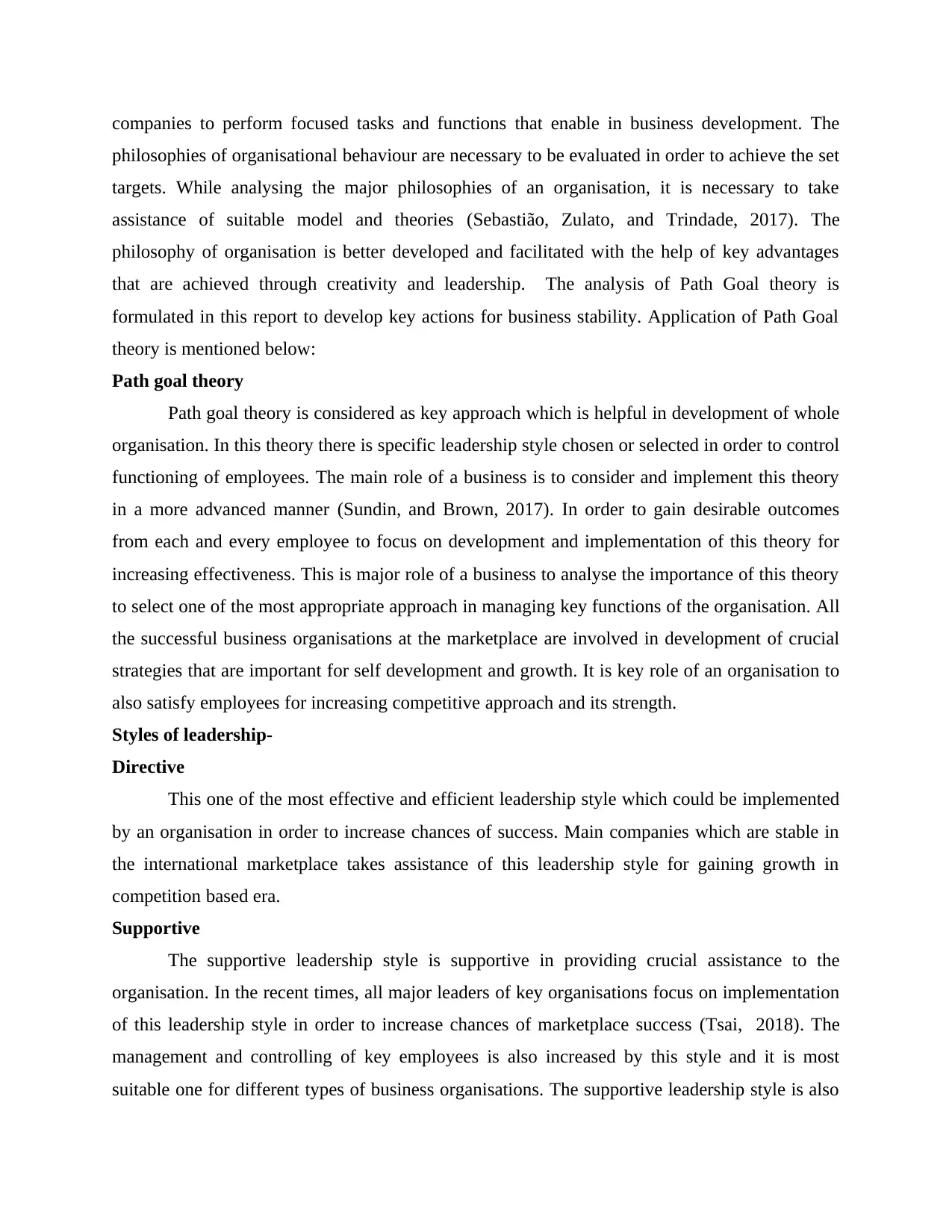
companies to perform focused tasks and functions that enable in business development. The
philosophies of organisational behaviour are necessary to be evaluated in order to achieve the set
targets. While analysing the major philosophies of an organisation, it is necessary to take
assistance of suitable model and theories (Sebastião, Zulato, and Trindade, 2017). The
philosophy of organisation is better developed and facilitated with the help of key advantages
that are achieved through creativity and leadership. The analysis of Path Goal theory is
formulated in this report to develop key actions for business stability. Application of Path Goal
theory is mentioned below:
Path goal theory
Path goal theory is considered as key approach which is helpful in development of whole
organisation. In this theory there is specific leadership style chosen or selected in order to control
functioning of employees. The main role of a business is to consider and implement this theory
in a more advanced manner (Sundin, and Brown, 2017). In order to gain desirable outcomes
from each and every employee to focus on development and implementation of this theory for
increasing effectiveness. This is major role of a business to analyse the importance of this theory
to select one of the most appropriate approach in managing key functions of the organisation. All
the successful business organisations at the marketplace are involved in development of crucial
strategies that are important for self development and growth. It is key role of an organisation to
also satisfy employees for increasing competitive approach and its strength.
Styles of leadership-
Directive
This one of the most effective and efficient leadership style which could be implemented
by an organisation in order to increase chances of success. Main companies which are stable in
the international marketplace takes assistance of this leadership style for gaining growth in
competition based era.
Supportive
The supportive leadership style is supportive in providing crucial assistance to the
organisation. In the recent times, all major leaders of key organisations focus on implementation
of this leadership style in order to increase chances of marketplace success (Tsai, 2018). The
management and controlling of key employees is also increased by this style and it is most
suitable one for different types of business organisations. The supportive leadership style is also
philosophies of organisational behaviour are necessary to be evaluated in order to achieve the set
targets. While analysing the major philosophies of an organisation, it is necessary to take
assistance of suitable model and theories (Sebastião, Zulato, and Trindade, 2017). The
philosophy of organisation is better developed and facilitated with the help of key advantages
that are achieved through creativity and leadership. The analysis of Path Goal theory is
formulated in this report to develop key actions for business stability. Application of Path Goal
theory is mentioned below:
Path goal theory
Path goal theory is considered as key approach which is helpful in development of whole
organisation. In this theory there is specific leadership style chosen or selected in order to control
functioning of employees. The main role of a business is to consider and implement this theory
in a more advanced manner (Sundin, and Brown, 2017). In order to gain desirable outcomes
from each and every employee to focus on development and implementation of this theory for
increasing effectiveness. This is major role of a business to analyse the importance of this theory
to select one of the most appropriate approach in managing key functions of the organisation. All
the successful business organisations at the marketplace are involved in development of crucial
strategies that are important for self development and growth. It is key role of an organisation to
also satisfy employees for increasing competitive approach and its strength.
Styles of leadership-
Directive
This one of the most effective and efficient leadership style which could be implemented
by an organisation in order to increase chances of success. Main companies which are stable in
the international marketplace takes assistance of this leadership style for gaining growth in
competition based era.
Supportive
The supportive leadership style is supportive in providing crucial assistance to the
organisation. In the recent times, all major leaders of key organisations focus on implementation
of this leadership style in order to increase chances of marketplace success (Tsai, 2018). The
management and controlling of key employees is also increased by this style and it is most
suitable one for different types of business organisations. The supportive leadership style is also
Paraphrase This Document
Need a fresh take? Get an instant paraphrase of this document with our AI Paraphraser
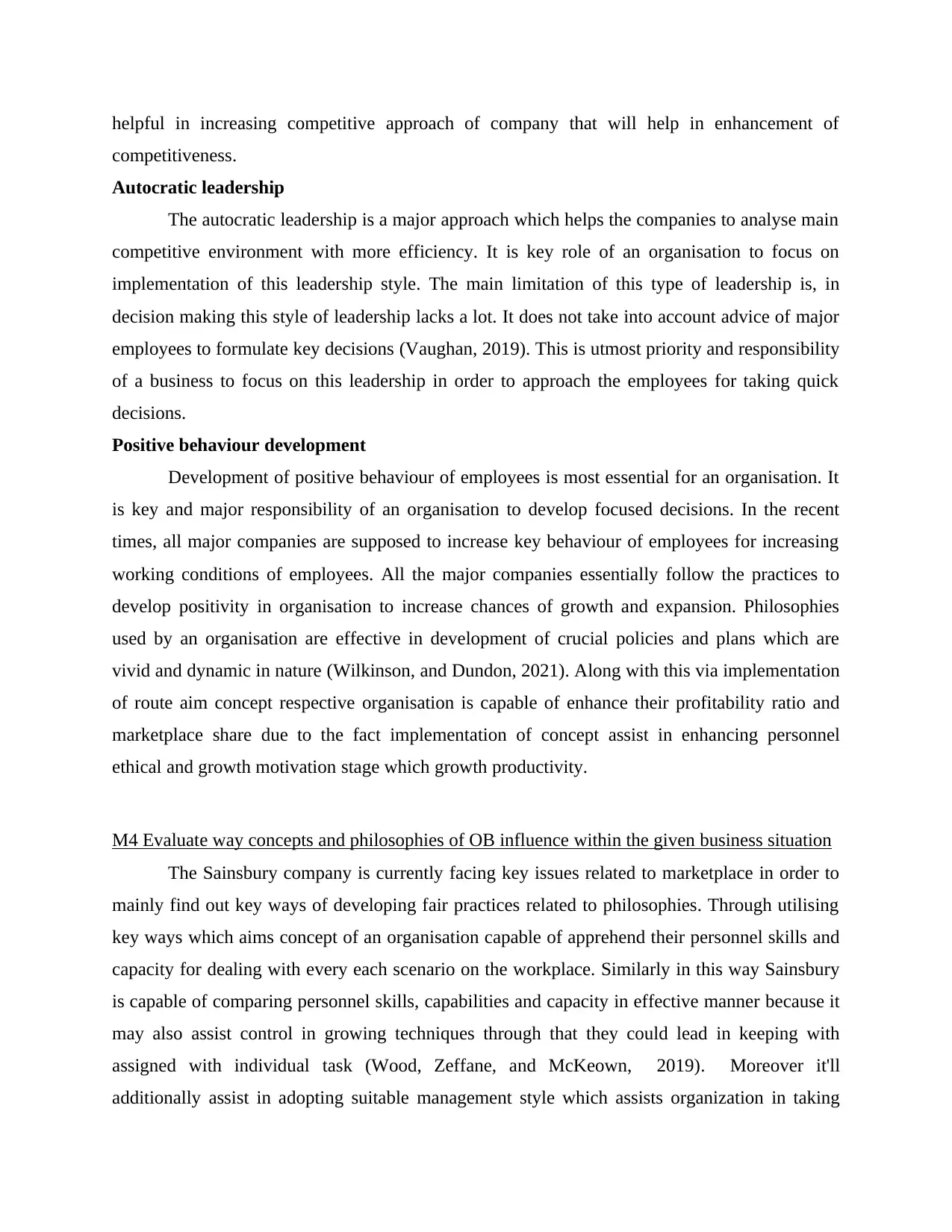
helpful in increasing competitive approach of company that will help in enhancement of
competitiveness.
Autocratic leadership
The autocratic leadership is a major approach which helps the companies to analyse main
competitive environment with more efficiency. It is key role of an organisation to focus on
implementation of this leadership style. The main limitation of this type of leadership is, in
decision making this style of leadership lacks a lot. It does not take into account advice of major
employees to formulate key decisions (Vaughan, 2019). This is utmost priority and responsibility
of a business to focus on this leadership in order to approach the employees for taking quick
decisions.
Positive behaviour development
Development of positive behaviour of employees is most essential for an organisation. It
is key and major responsibility of an organisation to develop focused decisions. In the recent
times, all major companies are supposed to increase key behaviour of employees for increasing
working conditions of employees. All the major companies essentially follow the practices to
develop positivity in organisation to increase chances of growth and expansion. Philosophies
used by an organisation are effective in development of crucial policies and plans which are
vivid and dynamic in nature (Wilkinson, and Dundon, 2021). Along with this via implementation
of route aim concept respective organisation is capable of enhance their profitability ratio and
marketplace share due to the fact implementation of concept assist in enhancing personnel
ethical and growth motivation stage which growth productivity.
M4 Evaluate way concepts and philosophies of OB influence within the given business situation
The Sainsbury company is currently facing key issues related to marketplace in order to
mainly find out key ways of developing fair practices related to philosophies. Through utilising
key ways which aims concept of an organisation capable of apprehend their personnel skills and
capacity for dealing with every each scenario on the workplace. Similarly in this way Sainsbury
is capable of comparing personnel skills, capabilities and capacity in effective manner because it
may also assist control in growing techniques through that they could lead in keeping with
assigned with individual task (Wood, Zeffane, and McKeown, 2019). Moreover it'll
additionally assist in adopting suitable management style which assists organization in taking
competitiveness.
Autocratic leadership
The autocratic leadership is a major approach which helps the companies to analyse main
competitive environment with more efficiency. It is key role of an organisation to focus on
implementation of this leadership style. The main limitation of this type of leadership is, in
decision making this style of leadership lacks a lot. It does not take into account advice of major
employees to formulate key decisions (Vaughan, 2019). This is utmost priority and responsibility
of a business to focus on this leadership in order to approach the employees for taking quick
decisions.
Positive behaviour development
Development of positive behaviour of employees is most essential for an organisation. It
is key and major responsibility of an organisation to develop focused decisions. In the recent
times, all major companies are supposed to increase key behaviour of employees for increasing
working conditions of employees. All the major companies essentially follow the practices to
develop positivity in organisation to increase chances of growth and expansion. Philosophies
used by an organisation are effective in development of crucial policies and plans which are
vivid and dynamic in nature (Wilkinson, and Dundon, 2021). Along with this via implementation
of route aim concept respective organisation is capable of enhance their profitability ratio and
marketplace share due to the fact implementation of concept assist in enhancing personnel
ethical and growth motivation stage which growth productivity.
M4 Evaluate way concepts and philosophies of OB influence within the given business situation
The Sainsbury company is currently facing key issues related to marketplace in order to
mainly find out key ways of developing fair practices related to philosophies. Through utilising
key ways which aims concept of an organisation capable of apprehend their personnel skills and
capacity for dealing with every each scenario on the workplace. Similarly in this way Sainsbury
is capable of comparing personnel skills, capabilities and capacity in effective manner because it
may also assist control in growing techniques through that they could lead in keeping with
assigned with individual task (Wood, Zeffane, and McKeown, 2019). Moreover it'll
additionally assist in adopting suitable management style which assists organization in taking
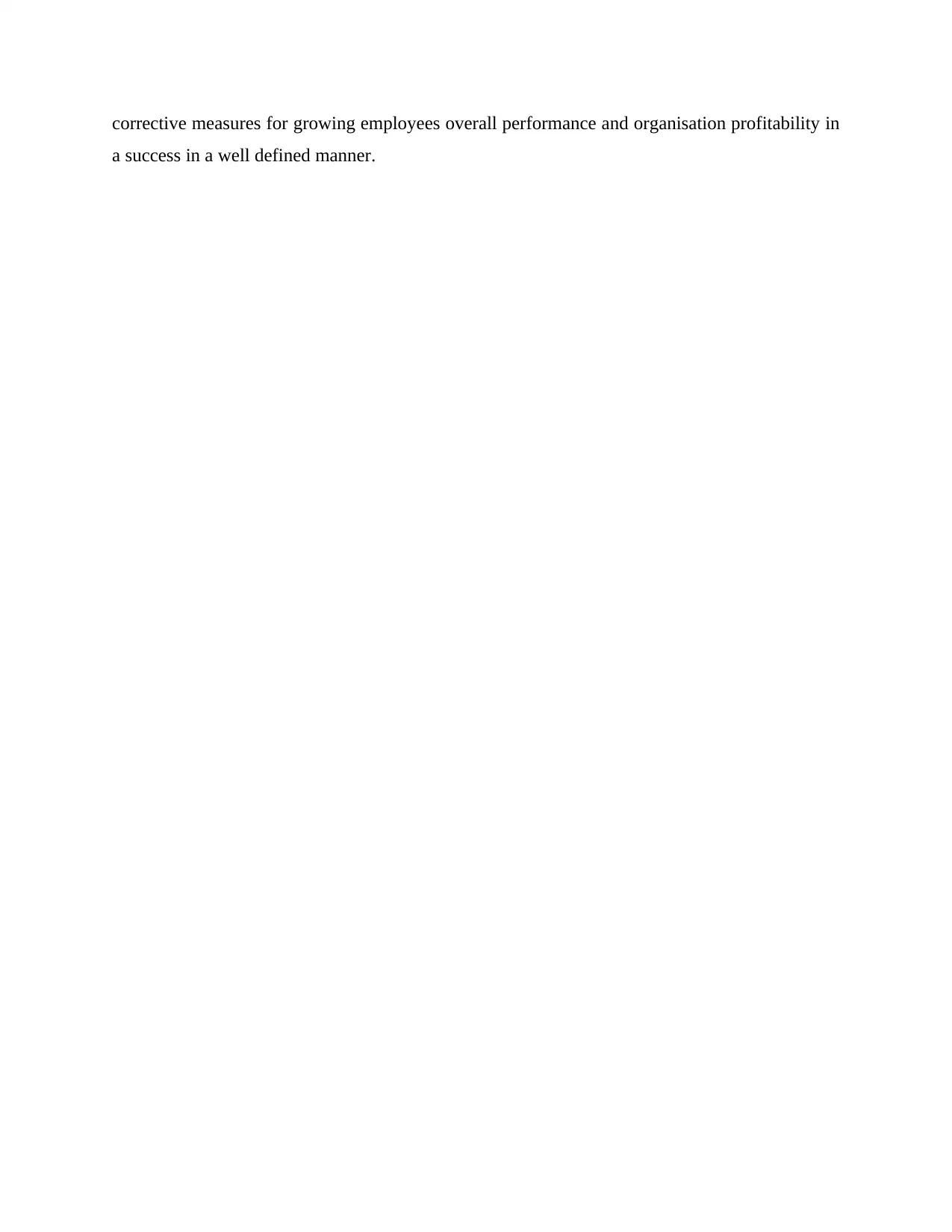
corrective measures for growing employees overall performance and organisation profitability in
a success in a well defined manner.
a success in a well defined manner.
⊘ This is a preview!⊘
Do you want full access?
Subscribe today to unlock all pages.

Trusted by 1+ million students worldwide
1 out of 15
Related Documents
Your All-in-One AI-Powered Toolkit for Academic Success.
+13062052269
info@desklib.com
Available 24*7 on WhatsApp / Email
![[object Object]](/_next/static/media/star-bottom.7253800d.svg)
Unlock your academic potential
Copyright © 2020–2025 A2Z Services. All Rights Reserved. Developed and managed by ZUCOL.





